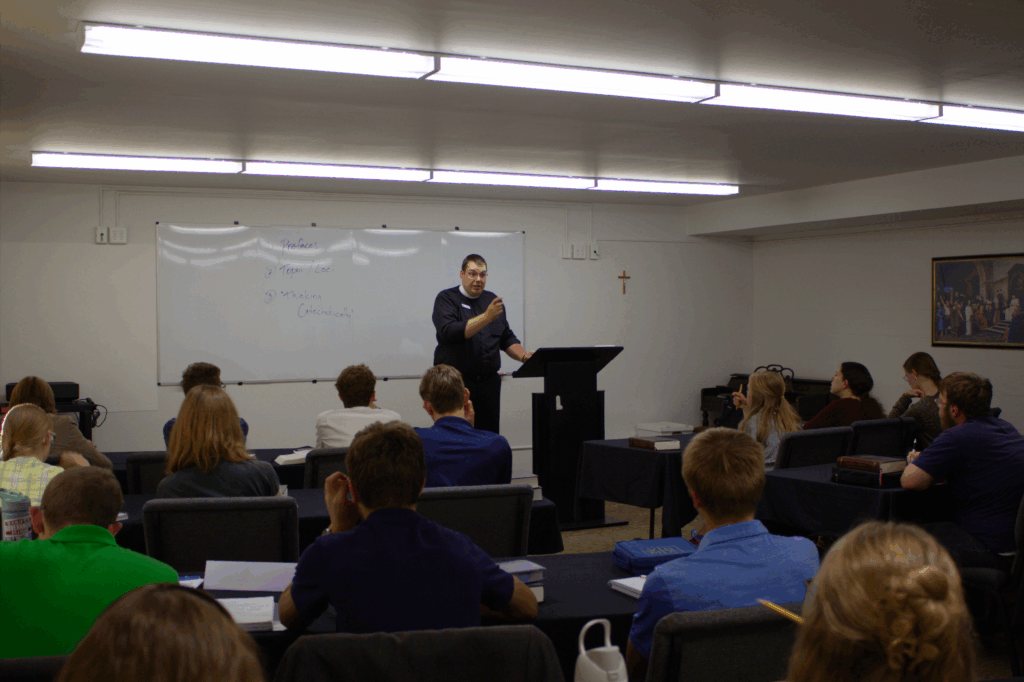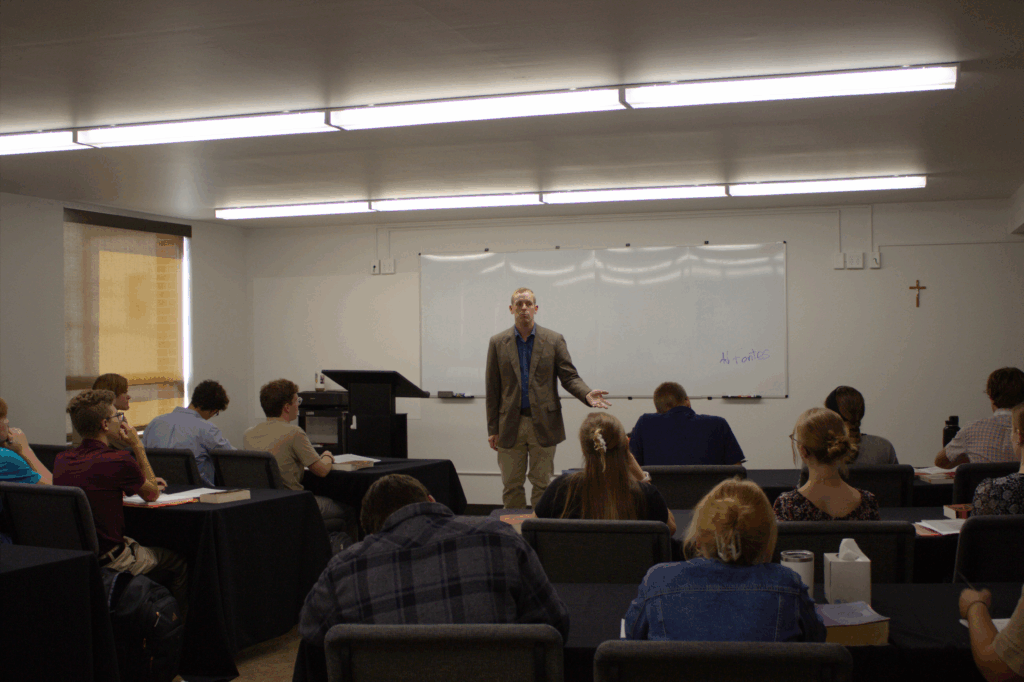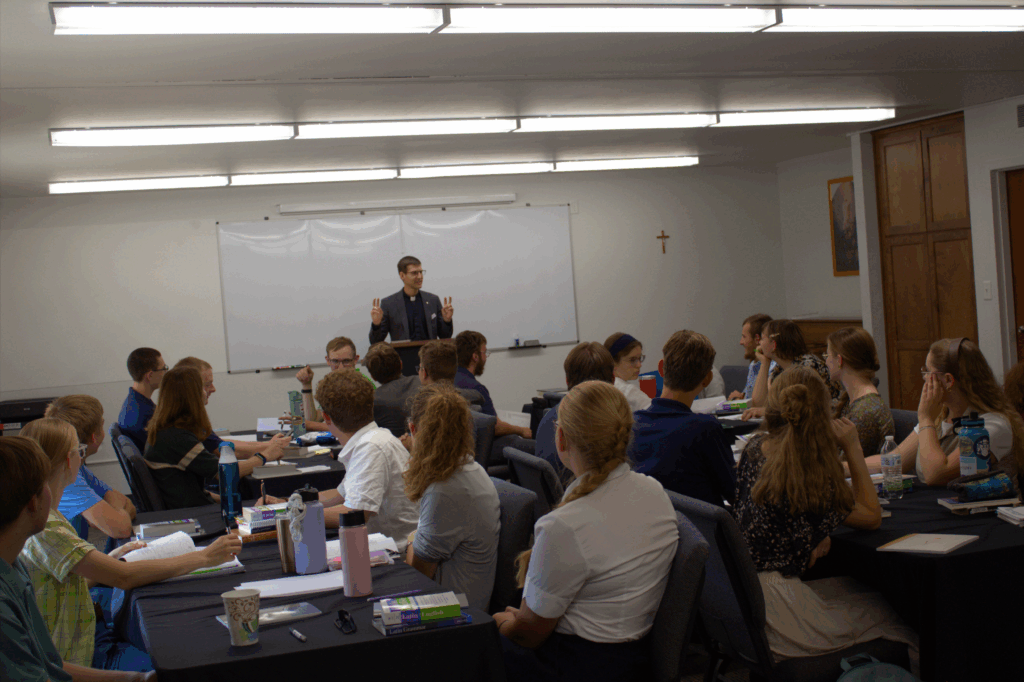Let it be known: the first-ever lecture delivered at Luther Classical College was in Literature 121: Greek Literature with Rev. Jacob Benson (he purposefully began a full minute early to secure the title). We discussed literary criticism, the dangers of reading stories, and the Theogony. After Greek Literature, we had our first matins service in the newly blessed chapel. Rev. Dr. Aric Fenske, the executive director of Lutherans for Life, delivered the sermon.
Next was Philosophy 100: Philosophical Inquiry kata Christon taught by Rev. Dr. Harold Ristau. “The purpose of this course is to give you a philosophical sense of smell. You may not be able to pinpoint where the error is, but you will know something is wrong,” said Dr. Ristau. During lunch, Dr. Fenkse gave a presentation on Lutherans for Life. This was one of five Christian Culture Seminars, which will be held throughout the semester. Students are expected to write an essay reflecting on one or more of them as part of Theology 181: Christian Culture I.
In Theology 100: Lutheran Commonplaces and Catechisms with Rev. Roger Mullet, we discussed norma normans (a rule that rules) and norma normata (a rule that is ruled) and how considering scripture, and scripture alone, as norma normans is in and of itself an act of faith. “You cannot logic the Bible up into that category. We are using philosophical words and categories to explain something that ultimately comes down to faith.”
Rev. Joshua Hayes’ Latin 233: Intermediate Latin Prose was very much… intermediate. As someone who hasn’t touched Latin in four years, it went well over my head. However, had I spent the summer reviewing, I believe it would have been manageable. Throughout the term, students will be translating Caesar and Cicero. Latin 132: Introductory Latin II, which I attended Tuesday morning, was much more my speed. We prayed the Pater Noster in Latin, of course, and translated passages about the Trojan Horse. Rev. Hayes still asked questions in Latin but would translate when he did so. It seemed quite accessible and slower paced while still offering a challenge to prepare students for the intermediate course.
Dr. Caleb Karges began History 121: Ancient Greece with a defense of history and an explanation of Herodotus’s importance as the first historian. “What makes Herodotus special, what makes history in the West special, is that Herodotus moves beyond mere chronicles and recitation of facts. He asks: ‘Why were those decisions made?’ and ‘What were the consequences?’”
Tuesday’s lunch was a much quieter affair than Monday’s. We were joined by several of the faculty members, namely, Dr. Ryan MacPherson, Dr. Karges, and Rev. Hayes. I find it very special that the professors choose to dine and socialize with the students. It’s not something you see very often on college campuses.
In Rhetoric 170: Progymnasmata and Composition, Dr. MacPherson walked us through different definitions of rhetoric, from Socrates to Cicero, Aristotle to Quintilian, before defining it himself as “winsome communication that brings people toward truth, goodness, and beauty.” We also covered the five canons of rhetoric: invention, arrangement, style, memory, and delivery; the three species of oratory: judicial, deliberative, and ceremonial; and the three means of persuasion: pathos, ethos, and logos. “As you start at LCC, you have a lot of new things to get used to. It can be overwhelming. Rhetoric 170 is designed to make your other classes easier. It will reinforce your history, theology, and philosophy,” said Dr. MacPherson.
These students are truly something else. Usually, at least in my experience, the start of a semester is an unmissably awkward affair. The natural camaraderie forged in shared tribulations takes weeks to build. Here, that camaraderie appeared not even halfway through orientation. The students have been both warm and welcoming, even to the resident spy. Community is a priority for both the students and the faculty—and not just LCC’s community, but the surrounding church communities as well.



